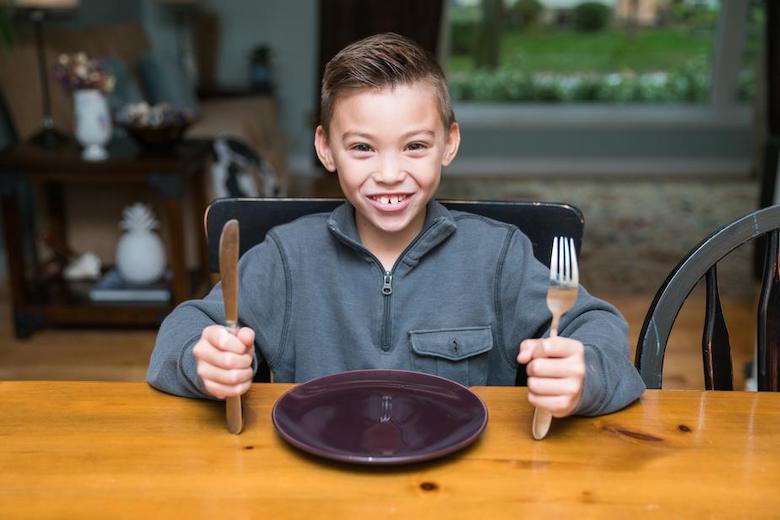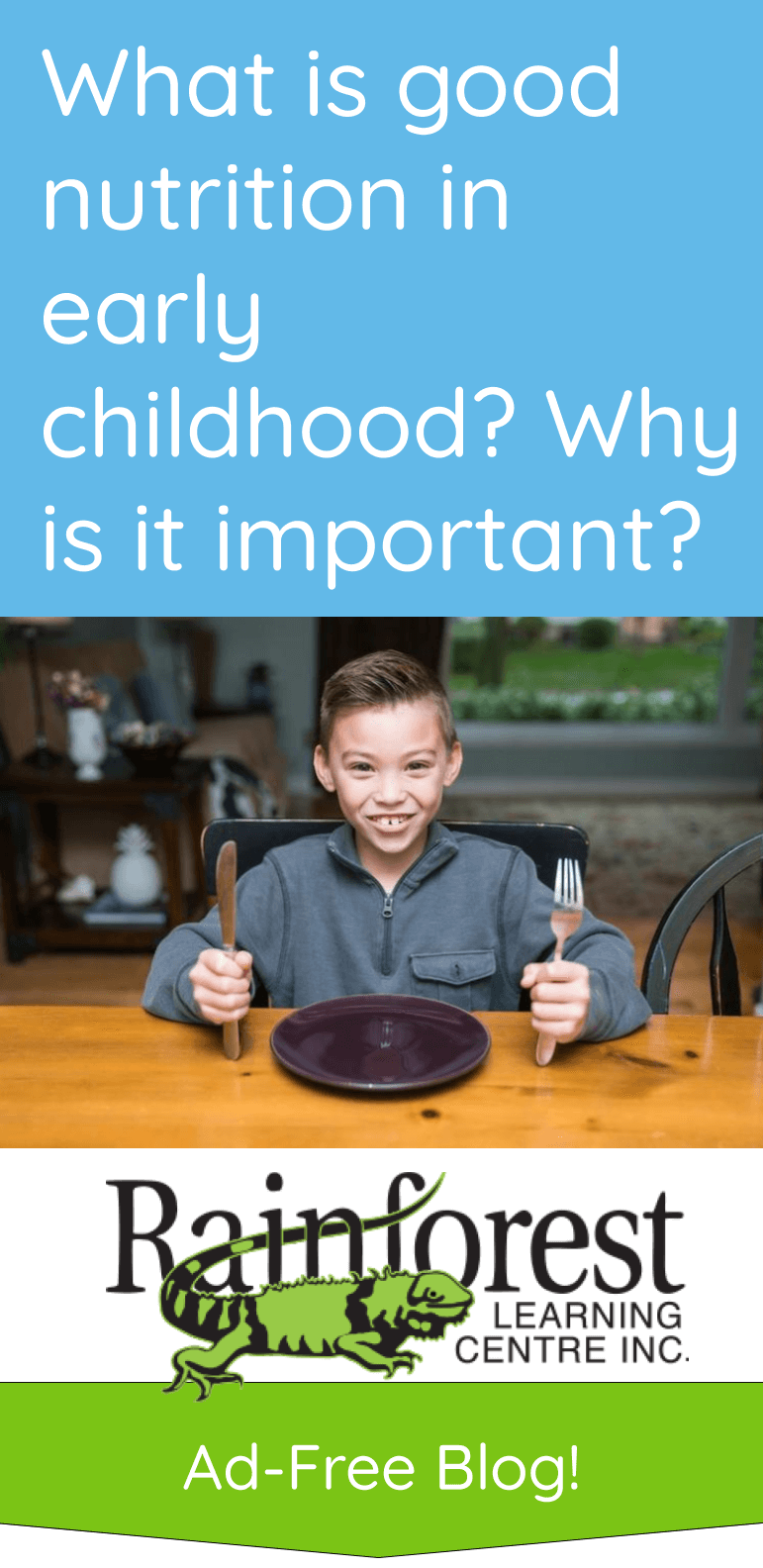
Many parents worry if their toddler or preschooler isn’t eating enough, or showing signs of obesity. So the question can be raised about whether or not a child’s habits are ok, even if they’re not what we expect them to be. What is good nutrition in early childhood? And how important is it? Didn’t we all ‘get by’ on whatever our parents gave us when we were growing up?
A lot has changed about our understanding of nutrition over the years. You know: eggs are bad for you, now they’re good for you; fat is bad, now certain types are good; diet soda is better than regular soda, now it’s worse; you should take vitamin supplements, vitamin supplements are a waste of money. And wow, the government food guides around the world are changing!
However, even with our updated understanding of nutrition, today there are still a lot of competing theories on diet. This article won’t get into all that. It also won’t get into special diets for allergy-prone children, or those with autoimmune disorders, or other special food restrictions.
Instead, we’ll focus on the general advice surrounding the question of what makes a good diet for preschool-aged children. There are some common ‘rules’ for eating right as a young child (and even as an adult), which many would agree with.
The good news is that, in our Western culture, food choices abound! So if some foods we mention don’t work for you, that’s probably ok. The point is to understand the principles behind good nutrition, and to avoid bad nutrition for children.
Toddlers and preschoolers need nutrients from a variety of food sources
While toddlers and preschoolers are notorious for being picky eaters, it is important that caregivers provide the right variety of foods to this age group. It can be a battle, but it is completely necessary. Children should not only eat bread, or chips, for instance. It also goes without saying that sugary foods should be limited (though not restricted to a large degree, as this can make children want them even more).
Food groups can be divided into:
- Meat
- Grains
- Vegetables and fruit
- Dairy (milk, cheese, yoghurt)
The following webpage describes the amount of servings that children need of the above categories:
https://www.hss.gov.nt.ca/en/services/food-and-nutrition/early-childhood-nutrition
However, you can see that, according to Canada’s Food Guide, at least half of our nutrition should come from vegetation:
https://food-guide.canada.ca/en/
With preschoolers, you may need to get creative, in order to get them to eat their vegetables (probably the most difficult food group to get into their little bodies!). You can mix the foods they like, with the veggies, to make them taste better.
For example:
- Add spinach and carrots to a fruit smoothie
- Blend veggies into spaghetti sauce or a cream sauce
- Add tiny bits of cucumber, dill and chives to a salmon salad sandwich
- Add cheese to broccoli.
- Make a blended cauliflower and zucchini ‘cream’ soup – this can also be delicious, making the vegetables almost ‘disappear’ in comparison to the cream base (which can be coconut milk if you’re trying to limit dairy).
- Sweet potato muffins
You can also try non-blended combinations which may help the flavour, like:
- Salted Kale chips or beet chips with olive oil (baked, preferably)
- Shepherd’s pie with an extra serving of peas and corn
- Quinoa flatbread as a pizza base, with tomato sauce and veggies on top
- Apples with peanut butter
The following website also has some ideas to prepare foods that can give children nutrition from a variety of choices:
https://www.healthxchange.sg/children/food-nutrition/healthy-food-growing-children
There is more to good nutrition in early childhood, though. Kids should learn to drink water primarily, more than juice. If juice is a must, try mixing with water to dilute the sugar, and choosing 100% juice. They should also get used to whole grains as much as possible. So for instance, whole wheat bread instead of white or just ‘brown’ bread, brown rice instead of white rice, whole wheat pasta, and so on. More about the reasons for choosing whole grains is covered in the following article:
https://kidshealth.org/en/parents/sugar.html
Regarding sweet, dessert and sugary foods, see this article on the best ways to handle eating these items, to prevent the ‘bad’ effects from happening your body, as much as possible:
https://www.today.com/health/block-sugar-your-body-7-easy-ways-1C9381792
Parents are the role models, and the controls, behind good nutrition in early childhood
Eating habits form early in life. And parents can do a lot to encourage healthy eating. For example:
- Cooking home-made meals as much as possible and involving children in the process.
- Avoiding processed and unhealthy foods when grocery shopping.
- Not giving in to children’s food choices based on food marketing (such as cartoons on cereal boxes, etc.)
- Not restricting sweets completely, but not encouraging it either.
- Eating as a family, at a table together, without distractions at the table (e.g. no screen time during meals).
- Not pushing children to eat more, if they say they are full.
- Eating healthy as role models.
- Not giving up after rejections on new food exposure. Keep encouraging kids to try a new food that is healthy. E.g. they may have never seen hummus before, and may reject it at first, but later find that they like it very much.
There are a host of resources on healthy eating in early childhood at the following website (including food ideas):
http://www.nscr.bc.ca/childcare/resources.html
Of course, staying active and limiting screen time go hand-in-hand with healthy eating habits. Caregivers should give children plenty of opportunity to burn off energy by playing outside with them, riding bikes or walking to school together, going on ‘active’ outings with the family (like bowling and swimming), and so on.
Children’s nutrition can be measured by the day, not the meal
It is normal for children to eat different amounts at different meals, and for that to be irregular. If your child has had a big breakfast, for instance, don’t worry if they eat very little for lunch and dinner (especially if they have been snacking throughout the day).
That said, meal times should be planned and follow a regular routine. This can avoid the issues of overeating and under eating. It can also help you watch what your child is taking in, since snacks throughout the day can be misleading as to how much nutrition a child has actually received.
Unhealthy eating in children can lead to serious health problems
Not eating healthily can have serious consequences for children. It can lead to lifelong problems that go beyond obesity, diabetes and high cholesterol. For example, not getting enough Vitamin D can lead to rickets (a bone disease). Eating a highly specific diet of fries, chips, white bread and ham slices led a teen boy to become blind!
That said, given our country’s abundance of food choices and access to social welfare, it would be rare for a child to experience these types of malnutrition problems. Still, parents should be aware of improper eating habits, and encourage children to take in all the nutrients they need, without making the eating experience a negative one.
Remember, children still need to feel control over their lives, to some degree. It’s part of personality development. So, while you shouldn’t ask them to eat beyond their capacity, you can limit their choices of food options to healthy ones, except in special circumstances.
See related on our blog:
- Do young kids need sleeping aids like melatonin? Keep these things in mind
- Teaching early learners about food cross contamination and cleanliness
- Teaching daycare kids about food safety
- Packing lunches that prevent food choking hazards at daycare
- How to manage your child’s allergies at daycare
- The importance of teaching kids decision-making skills in early childhood
- Preschool activities to start, grow and maintain an edible classroom garden
